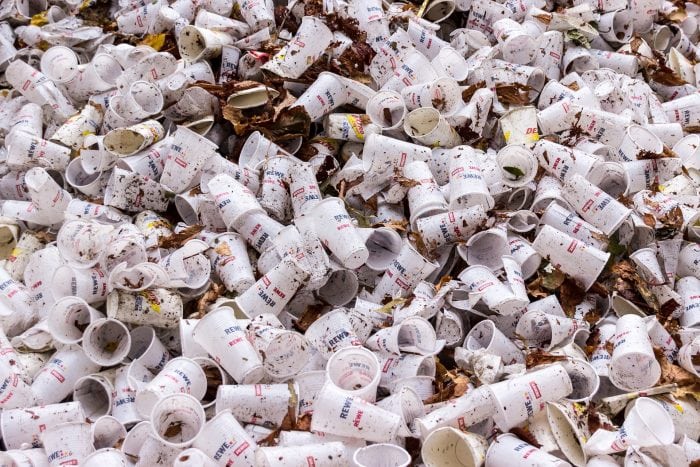
Following legislation in Seattle, Starbucks has announced that they will work to eliminate plastic straws from their stores by 2020. They will create recyclable alternatives that will eventually be rolled out across all their stores around the world.
This move comes as many places around the world are examining our relationship with plastic. Seattle became the first state in the United States to ban single-use plastics such as straws. This means that food and beverage retailers, among others, will be required to eliminate straws and other items from their stores and introduce products made of materials that are compliant with the ban.
Starbucks plan is to introduce their new products in Seattle and Vancouver this fall and continue rolling out the new products next year across the US and Canada. These products include straws made from alternative materials and recyclable plastic lips made for sipping.
After testing in North America, Starbucks will work on their European markets as they begin in France and the Netherlands.
The lid alternatives are already available in over 8,000 stores in North America for select beverages only. As they widen its use to other iced-beverages, they are also implenting it in markets such as Singapore, Thailand, and Japan.
According to Starbucks, this comes as one of the steps they are taking towards their $10 million commitment to create a fully recyclable and compostable solution to their plastic cups used around the world.
When these new products are fully introduced, Starbucks anticipates that over 1 billion plastic straws will be eliminated from Starbucks stores annually.
In their announcement of this goal Keven Johnson, president and CEO for Starbucks, says “for our partners and customers, this is a significant milestone to achieve our global aspiration of sustainable coffee, served to our customers in more sustainable ways.”
This move stands to become even more impactful because Starbucks reports that iced beverage purchase has risen to about 50% of their sales from 37% only a few years ago. All their cold beverages are served in plastic containers so these new alternatives will work synergetically with the new trends they are experiencing.
This announcement has been met with positive reception from many advocates for the elimination of plastic products. It also marks Starbucks continued commitment towards building an ethically and environmentally sound business.
Other Companies Eliminating Single-Use Plastics
Starbucks is not alone when it comes to eliminating plastic straws from its stores as other companies have begun to create their own alternatives.
McDonald’s, a global fast food chain, has announced that some of its stores will be testing paper straws as it begins the process of eliminating plastics from its stores. They will also be moving their existing straws behind the counters. Their straws are already 100% recyclable, but they are committing to doing more because if no one recycles the straws, then it does not matter.
Many companies in the United Kingdom has begun to make changes to their plastic items as well, following increased interest in eliminating single-use plastic across the country. These include major bar chains, coffee chains, and supermarkets.
Pret A Manger is among the coffee chains to replace their plastic straws with alternatives. They are slowly growing their influence in the United States, so this move would allow them to get ahead of many emerging bans.
London City Airport announced in February that they had removed plastic straws from their venues.
Many hotel chains, including Hyatt and Marriott International, have also begun to reduce their environmental impacts by replacing plastics with alternative items, such as biodegradable straws.
Airlines, such as American Airlines and Alaska Airlines, have announced that they too would ditch their plastic straws for better alternatives.
A Plastic Problem
Plastic straws are an American staple seen across almost all food and beverage retailers. It exists as a crucial item that we constantly use. It started out in the 1930s as an alternative to paper straws, which were not as effective at drawing up liquids as plastics.
It became especially important in Hospitals because it was very easy for their patients to drink out of it in bed. Following the Second World War, it was produced at such fast rates that it pushed itself into the mainstream and became a consumer staple.
Unfortunately, all that mass production and consumption of plastic straws and other plastics has led to a major environmental and health concern across the world. Over 8 million tonnes of plastics find their way into the ocean annually and plastic straws are one of the biggest contributors to this. This has amounted to about 5 trillion pieces of plastic floating around the ocean as we speak.

Plastic cups and plastic straws are among the top items found left on beaches after they are used. Credit: Pixabay
Microplastic items and even larger plastic materials have been found inside many fish species, including some consumed by humans. These cause major problems for the aquatic food chains, which serve as an important food supply for us.
Researchers found that there were about 7.5 million plastic straws found across the shorelines of the United States. Using this, they estimate that there is anywhere from 437 million to 8.3 billion plastic straws on the coastlines around the world.
Bans on single-use plastics as well as other plastic items are an important step in the right direction, but bans alone will not solve the world’s plastic problem. There is a tremendous amount of plastic waste around the world that must be dealt with alongside these bans.
Alongside bans, we have to develop means of properly disposing of our current plastics and finding ways to eliminate plastic wastes from major food chains, like those in the oceans.
This means working on systems to convert plastic waste into products that can be reintroduced to consumers. This also means finding ways of breaking down plastics so that they can be more easily decomposed by the environment.









